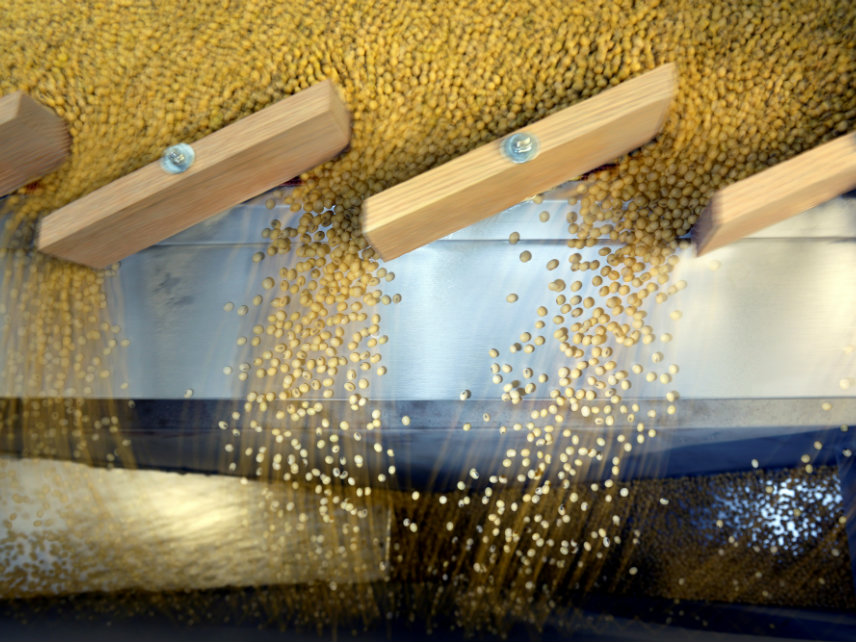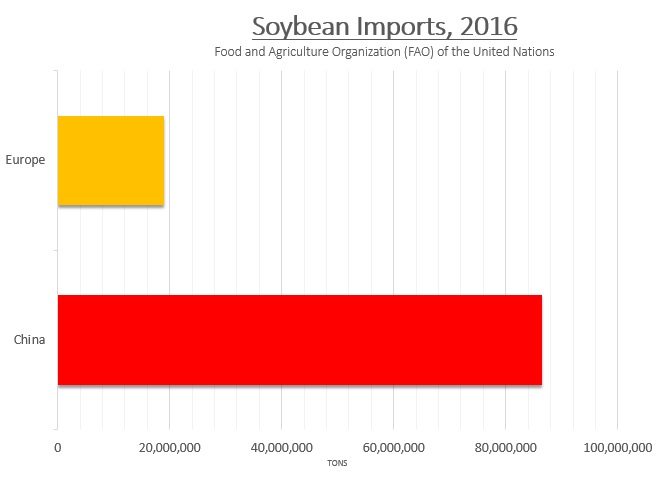Trump's Soybean 'Deal' With the E.U. Is Actually Pretty Insignificant
Europe already imports soybeans for free, and the European market isn't big enough to make up for China anyway.

It's a testament to the power of the tiny soybean—or, actually, the political power of the farmers that grow them—that the Trump White House has been scrambling this week to appease growers' complaints about the consequences of the president's ill-thought-out trade war. But the president's latest maneuver will do nothing to alleviate the harm caused by his own bellicose trade policies.
First, there was the attempt to buy farmers' support, with the White House announcing that it would spend $12 billion through a New Deal-era crop insurance program to bail out farms harmed by tariffs. This is the policy equivalent of lending a garden hose to the fire department after setting your house on fire (and then sticking taxpayers with the water bill). Then, on Tuesday, Trump was eager to announce the bare bones of a trade deal with European Commission President Jean-Claude Juncker that would see the E.U. importing more soybeans.
Soybeans are a critical battleground in the trade war because the United States produces so damn many of them. Farmers planted more than 89 million acres of soybeans across the United States in 2018, narrowly edging out the 88 million acres of corn that were planted, according to an annual survey by the Department of Agriculture. The United States is the world's largest exporter of soybeans, with nearly half the U.S. crop exported annually—and China is the largest importer of them. There are few singular products that better illustrate the benefits of global trade between the world's two largest economies than the humble soybean.
But it was only after this year's soybean crop was already planted that Trump announced his tariffs on steel, aluminum, and Chinese-made goods. China responded to those tariffs by targeting America's soybean crop—since then, the price of soybeans has fallen dramatically—leaving American farmers in the lurch.
US and Brazil FOB soybean flat price price spreads from @FT pic.twitter.com/PTccawwXHT
— Kevin Roepke (@SoyMaizstro) July 18, 2018
That's why, at first blush, yesterday's joint announcement by Trump and Juncker appears to be a positive development—and, to be fair, any indication of a cease fire in the trade war is welcome. But a mere handshake agreement to send more soybeans across the Atlantic won't make up for a reduction in exports across the Pacific.
For starters, that's because the European Commission doesn't actually have authority over how many soybeans Europe imports. It doesn't procure soybeans for European markets and it doesn't tell European businesses where to buy their soybeans.
Of course, there are other ways that governments can encourage businesses within their borders to purchase materials from certain sources. Lowering trade barriers is one way to do it. If the Trump-Juncker agreement would lower European tariffs on American-grown soybeans, for example, that might do the trick of getting Europe to buy more American beans.
Except, well, the European Commission currently doesn't charge any tariffs on American soybeans. Which means European businesses already have access to all the American soybeans they would want. It's hard to see how—short of subsidizing demand across the pond—Juncker will follow through with his promise to have Europe buy more soybeans (falling global prices might encourage more buying in Europe, but not to a significant degree).
Rather than being an agreement to import more soybeans, it seems like Tuesday's deal was really nothing more than a pledge that Europe would not slap new tariffs on soybeans in response to American tariff-raising, like China did. Further reporting from Brussels seems to bear out that conclusion.
SOYBEAN MADNESS UPDATE: EU official confirms the Trump/Juncker agreement is a political pledge by the EU not to do anything that affects the market conditions responsible for Europe buying more beans. (Which also come in the form of cakes.) All clear?
— Adam Fleming (@adamfleming) July 26, 2018
In other words, Tuesday's deal was not a sign that Trump's tariffs are forcing foreign officials to accept more global free trade—as the administration's defenders continue to claim.
It's also worth considering the scale of the soybean markets in China and Europe. In 2016, the most recent year for which full data are available in the United Nations Food and Agriculture Organization database, China imported more than 86 million tons of soybeans while Europe imported just under 19 million tons. Unless Juncker and Trump plan to start jamming soybeans down European throats, foie gras-style, there's simply no way that Europe can consume enough soybeans to make up for the loss of China as an American export market.

And all of this posturing ignores one simple fact: Even if Europe did somehow manage to buy up all the soybeans that won't be sold to China this year, American farmers would only be breaking even, not coming out ahead. At best, the Trump-Juncker deal, like the White House's plan to bail out tariff-stricken farmers, is a band-aid on a wound willfully inflicted by Trump. This isn't improving global markets or increasing free trade; it's just damage control.


Show Comments (70)